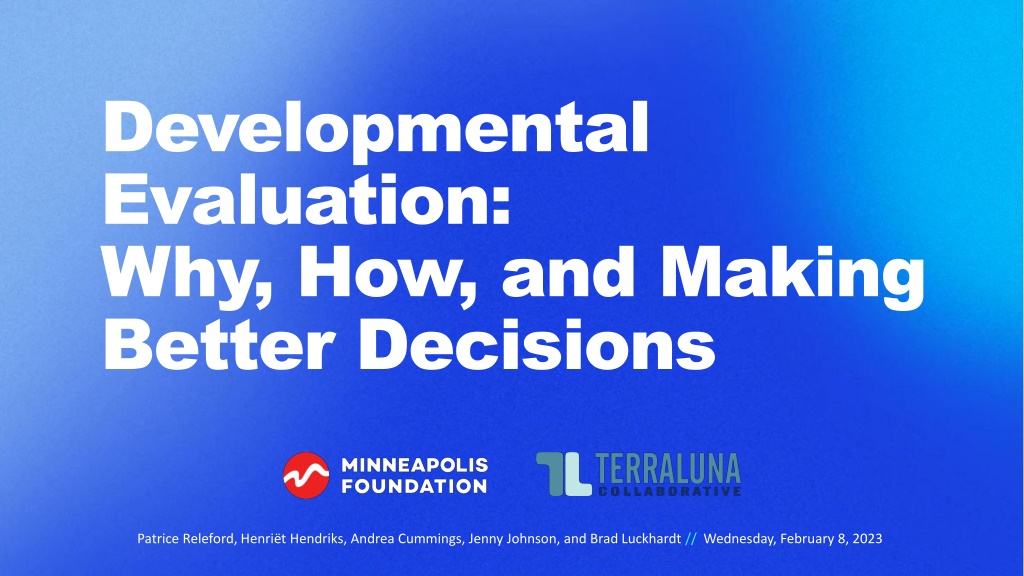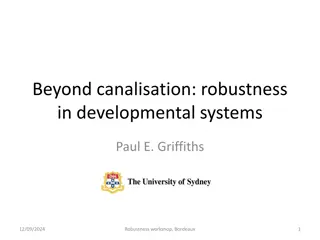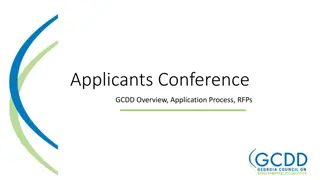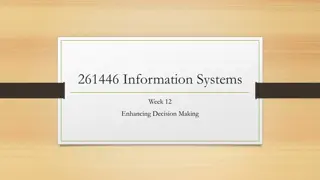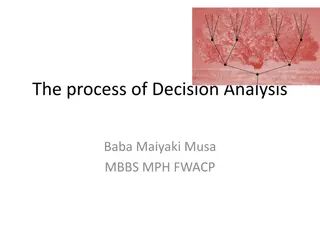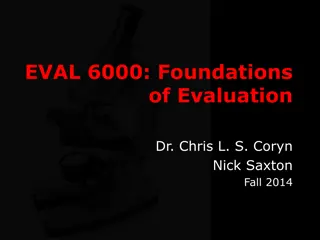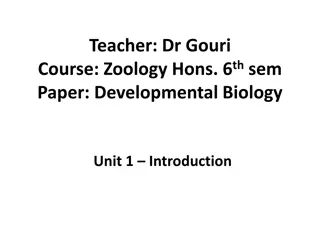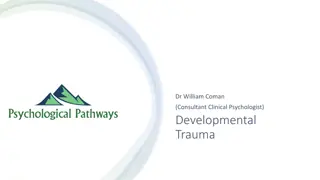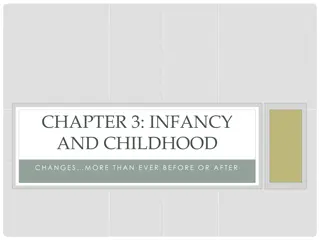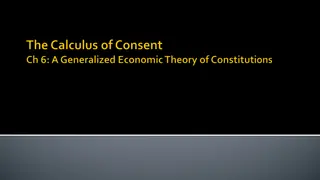Exploring Developmental Evaluation for Better Decision-Making
Delve into the realm of developmental evaluation, focusing on its purpose, principles, and application in practice. Understand how developmental evaluation emphasizes real-time data collection for informed decision-making in complex systems. Learn about key principles such as developmental purpose, systems thinking, and co-creation, and explore its role in strengthening organizations like the OneMPLS Fund. Gain insights on formative and summative evaluation approaches, and discover how equitable evaluation can enhance the impact of developmental evaluation processes.
Download Presentation

Please find below an Image/Link to download the presentation.
The content on the website is provided AS IS for your information and personal use only. It may not be sold, licensed, or shared on other websites without obtaining consent from the author. Download presentation by click this link. If you encounter any issues during the download, it is possible that the publisher has removed the file from their server.
E N D
Presentation Transcript
Developmental Evaluation: Why, How, and Making Better Decisions Patrice Releford, Henri t Hendriks, Andrea Cummings, Jenny Johnson, and Brad Luckhardt // Wednesday, February 8, 2023
AGENDA Overview of Evaluation Purpose Developmental & Equitable Evaluation Developmental Evaluation in Practice Key Action Steps and What We Learned Questions Break-out Groups
Overview of Evaluation Purpose
OneMPLS Fund Overview The OneMPLS Fund launched three years ago and pools money from the community to respond nimbly to pressing community needs. Each grant round has addressed a different topic or community focus. Prior to the pandemic, the Fund addressed Housing. Since 2020, the fund has supported Pandemic Relief, Rebuilding and Capacity Building.
Evaluation Purpose Foundation Level Outcomes Use our Strategic Framework to guide learning and collaboration Generate and use insights to guide OneMPLS Fund Experiment with Developmental and Equitable Evaluation to inform the future of the Foundation's evaluation work OneMPLS Fund Level Outcomes Engage and learn with grantees, donors, and cross- departmental team to strengthen the Fund and understanding of the Fund
Developmental & Equitable Evaluation
What Does Developmental Evaluation Emphasize Formative or summative evaluation approaches examine costs, benefits, best practices, replicability, scale, and in most cases quantitative evidence. Developmental evaluation is (1) grounded in systems thinking and supports innovation amidst complexity (2) by collecting real-time data or feedback in ways that (3) lead to informed, ongoing decision-making about design, development and implementation.
Key Principles of Developmental Evaluation Michael Quinn Patton Michael Quinn Patton 1. Developmental purpose 6. Systems thinking 2. Evaluation rigor 7. Co-creation 3. Utilization focus 8. Timely feedback 4. Innovation niche 5. Complexity perspective
Complexity of OneMPLS Fund Three grant rounds happened in very different moments. The identity of the OneMPLS Fund evolved rapidly during 2019 and 2020. The moment when donors contributed and when grantees received support affected their perceptions of the fund and its purpose.
Journaling A. Think about a Fund, Program, or Process in your organization that you are interested in for evaluation. B. Where would you put that Fund, Program, or Process: Obvious, Complicated, or Complex? C. Which type of evaluation might be the best fit: Formative, Summative, or Developmental Evaluation?
Developmental Evaluation in Practice
Process Plan vs. Reality Phase III Phase I Grounding Phase II Inquiry Adoption & Reporting Grantee report review, interviews with grantees and donors Meaning-making to transform insights into learning and actionable change. Articulate the initial desired outcomes and the initial process outline Data analysis Disseminating learning and publishing evaluation results Prepare foundation to engage with developmental evaluation Iterative Learning
What Developmental Evaluation Sounds Like Insight from Grantee: Responsiveness is about letting communities determine what is priority and using our resources, whether that be human or process or financial or just influence, to be able to make sure that communities are heard. To make sure that community ideas are at the center of how we move forward or address certain challenges and things. Insight from Donor: I would like to see the leaders of this fund staying alert, being in a receptive mind, being on the lookout. That's the role the Foundation can play because donors are busy - they've got kids, work, stuff happening - grantees are too busy - they are out there doing the work in the city. The Foundation s role is to be paying attention and being ready to respond as needed.
What We Learned for Impact Team Responsiveness Value Quick Decisions & Allocation of Resources Grateful for Flexibility & Opportunities to Innovate Appreciate Simple Application Process Would Prefer Conversational Reporting
Grantee Insights Increased inclusivity and community engagement Program and service continuity Plan for and adapt to changes Be responsive to the community's needs Bridging a gap in financial support
What We Learned for Philanthropic Services Trust in the Minneapolis Foundation Desire to Make a Meaningful Impact in Minneapolis Value of the OneMPLS Fund Power of Responsiveness Cautions about Responsiveness Power of Collective Giving
How Did Developmental Evaluation change the conversation with Donors? Changing perception of control Changing what we needed to share with donors Defining responsive grantmaking and redefining impact Moving from selling Fund to learning Understanding that the nature of the Fund won t align or appeal with everyone
Key Action Steps and What We Learned
What Developmental Evaluation Action Steps Look Like Provide more clarity about the identity of the Fund Clarify Messaging for All Stakeholders Map out the Landscape of Featured Funds Continuous Improvement & Effectiveness
Living Into What We Learned Reflecting and evaluating our own strategies (not evaluating grantees) Serving the community first, not necessarily the structures that exist within orgs Decision-making affected by this evaluation process Tool for embracing Framework and values with Donors and Fund Holders
Break-out Groups Questions for Discussion Questions to determine if you are ready to try Developmental Evaluation? Conditions for Our Success Working group with representation from multiple departments, including leadership and decision-makers (ability to take learning into action) People open to engaging in a dynamic and flexible process Active participation in the meaning-making process Challenge one another, disagree, consider new ideas, and continuously seek to strengthen the Fund o Appropriateness? (Is DE the right thing?) o Institution s readiness? Are people ready to learn? Open to qualitative measures? Can form a cross- developmental team to execute? o What are some of the pieces of DE that you could embrace? Pick one big idea to share out from your group/table
Helpful Links OneMPLS site https://www.minneapolisfoundation.org/onempls-fund/ Are You Really Ready For Developmental Evaluation? https://medium.com/@jcoffman/are-you-really-ready-for-developmental-evaluation-you- may-have-to-get-out-of-your-own-way-9c7e8ae7584b Developmental evaluation: Applying complexity concepts to enhance innovation & use https://www.betterevaluation.org/tools-resources/developmental-evaluation-applying- complexity-concepts-enhance-innovation-use Cynefin Framework https://www.youtube.com/watch?v=N7oz366X0-8
Patrice Releford, Henrit Hendriks, Andrea Cummings, Jenny Johnson, and Brad Luckhardt // Wednesday, February 8, 2023
